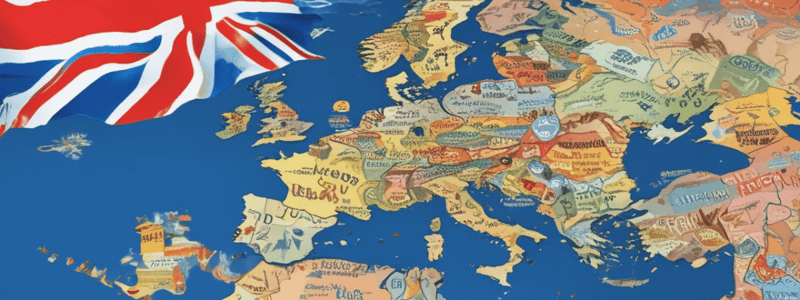Podcast
Questions and Answers
What is the main activity that special interest groups use to influence EU decision-makers?
What is the main activity that special interest groups use to influence EU decision-makers?
- Conducting audits
- Lobbying (correct)
- Participating in elections
- Establishing political parties
In what stage of the EU decision-making process do special interest groups primarily engage?
In what stage of the EU decision-making process do special interest groups primarily engage?
- Consultation stage (correct)
- Post-decision evaluation
- Public announcement phase
- Final voting stage
What kind of activities do special interest groups NOT engage in to exert influence?
What kind of activities do special interest groups NOT engage in to exert influence?
- Public protests
- Lobbying
- Negotiating treaties (correct)
- Information campaigns
Which of the following statements is true regarding the role of special interest groups in the EU?
Which of the following statements is true regarding the role of special interest groups in the EU?
The Irish Farmers Association (IFA) protested in 2019 due to what issue?
The Irish Farmers Association (IFA) protested in 2019 due to what issue?
From which of the following activities do special interest groups receive data to support their arguments?
From which of the following activities do special interest groups receive data to support their arguments?
Which of these is NOT identified as a common policy in the EU?
Which of these is NOT identified as a common policy in the EU?
What is one of the key functions of special interest groups in raising awareness?
What is one of the key functions of special interest groups in raising awareness?
What is the primary purpose behind the information campaigns run by special interest groups?
What is the primary purpose behind the information campaigns run by special interest groups?
Which of the following best describes special interest groups' involvement in political processes?
Which of the following best describes special interest groups' involvement in political processes?
Flashcards are hidden until you start studying
Study Notes
European Union Overview
- The EU is a trading bloc facilitating close political, economic, and social cooperation among 27 Member States.
- It allows free trade among Member States, enhancing economic ties.
- All members share running costs and contribute to the EU’s decision-making process for policy and law formulation.
EU Values and Goals
- Promotes peace among European nations.
- Ensures good living standards for all EU citizens.
- Strives for fairness and inclusivity, respecting diverse languages and cultures.
- Aims for a robust and competitive European economy.
EU Institutions
- European Commission: Executive body overseeing EU operations with a commissioner from each member country; led by Ursula Von Der Leyen.
- European Parliament: Directly elected representatives ensuring democratic functioning; Ireland has 13 MEPs, increasing to 14 in September 2023.
- Council of the European Union: Main decision-making entity where ministers convene to coordinate policies and adopt laws.
- European Council: Consists of heads of Member States; outlines political priorities and addresses complex EU issues without law-making authority.
- European Court of Auditors: Oversees EU financial management and ensures accountability, acting as an external auditor.
- Court of Justice of the European Union: Interprets EU law uniformly across Member States and resolves legal disputes.
Deregulation and Competition
- Deregulation fosters competition and reduces protectionism, particularly benefiting consumers with varied choices and prices.
- Irish firms must enhance competitiveness due to deregulated sectors like electricity and airlines.
- Globalization presents challenges to indigenous firms by introducing multinational competitors offering quality goods at lower prices.
European Commission Functions
- Engages with special interest groups and experts to discuss proposed laws.
- Drafts, proposes, and supervises implementation of EU laws.
- Manages EU funding programs and budgets, determining fund allocation to Member States.
European Parliament Functions
- Discusses and amends proposed legislation from the European Commission.
- Debates and adopts the annual EU budget alongside the Council.
- Oversees EU operations and can dismiss the European Commission.
Council of the European Union Functions
- Comprises government ministers from each EU country addressing specific ministries.
- Responsible for negotiating and adopting EU laws and jointly adopting the annual EU budget with the Parliament.
- Final authority on proposed legislation, requiring cooperation with the European Parliament for approval.
European Council
- Composed of heads of Member States, the President of the Council, and the Commission.
- Defines political direction and priorities of the EU, addressing complex issues without legislative power.
European Court of Auditors Functions
- Enhances EU financial management and transparency, safeguarding citizens' interests.
- Conducts audits to ensure sound financial practices and value for taxpayer investments.
Court of Justice of the European Union (CJEU)
- Ensures consistent application of EU law across Member States.
- Resolves legal disputes and imposes fines on states violating EU law.
EU Decision-Making Process
- Proposal drafted by the European Commission.
- European Parliament reviews and amends the proposal.
- The Council decides on the proposal alongside the Parliament.
- Implementation of approved legislation is the responsibility of the European Commission.
EU Law Implementation (R2D2)
- Regulation: Enforceable immediately and takes precedence over national law, ensuring uniformity.
- Recommendation: Non-binding advice to member states.
- Decision: Binding on specific individuals or countries, tailored to particular cases.
- Directive: Establishes desired results with flexibility for Member States in achieving them.
Role of Special Interest Groups
- Influence EU decision-making, particularly during consultations.
- Engage in lobbying, information campaigns, and public protests to advocate for their causes.
EU Common Policies
- Economic and Monetary Union (EMU)
- Common Agricultural Policy (CAP)
- Common Fisheries Policy (CFP)
- Competition Policy
Studying That Suits You
Use AI to generate personalized quizzes and flashcards to suit your learning preferences.




